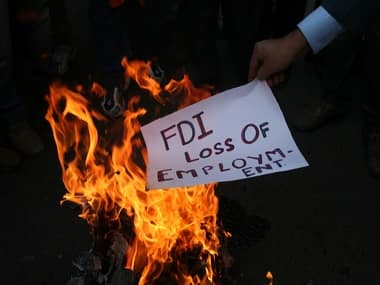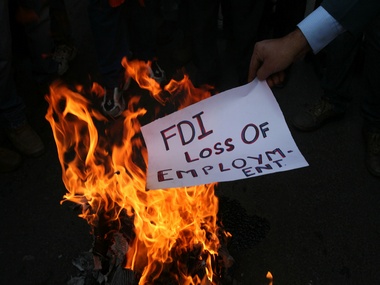For India Inc, the government’s ‘pause’ over introducing foreign direct investment in multi-brand retail in the face of stiff political opposition is extremely frustrating.
Exasperated by lawmakers (including the government’s allies and the Opposition) who have stalled parliamentary proceedings for over a week because of the proposal, two prominent business leaders, HDFC chairman Deepak Parekh and Hindustan Unilever’s former chairmanAshok Ganguly, have released a joint statement.
The statement, “The false dangers of FDI in modern retail trade”, calls for “saner sections of Corporate India to come out and strongly support progressive measures and reforms with the same spirit and gusto with which we take the liberties to criticise policies or issues we do not appreciate.”
[caption id=“attachment_148346” align=“alignleft” width=“380” caption=“An activist of Shiv Sena burns a pamphlet during a protest against Foreign Direct Investment. Reuters”]
 [/caption]
[/caption]
Both leaders pointed out that from the experiences of China, Indonesia and other countries, modern retail trade and traditional traders “can, and do, prosper side by side, raising employment along the supply chain, improving farm incomes, reducing spoilage and delivering affordable products to consumers.”
Indeed, as several Firstpost articles have noted recently, the opposition to foreign retail giants has been driven primarily by political considerations rather than economic.
The Wal-Mart effect: Is it really that bad?
Contrary to popular opinion, Wal-Mart, according to some reports, is not completely evil. An article in The Wall Street Journal noted thatfrom roughly the mid-1990s to 2004, the last year for which relevant data is available, big-box retail, and Wal-Mart in particular, was a significant driver of US productivity growth . In fact, almost 50 percent of America’s economywide productivity advantage over Europe over this period came from wholesaling and retailing, it added.
The newspaper also quoted a study by the Indian Council for Research on International Economic Relations which looked at the effect organised retailing has on the unorganised retail sector . It shows that, on average, when an organised retailer opens, the kirana stores nearby generally lose about 23 percent of their sales in the first year, but are back at their original sales figures within five years. About 1.7 percent of traditional stores close down every year, but, even in the medium to long run, traditional retailers will still control 85 percent of the market, according to the study.
Impact Shorts
More ShortsTime magazine also noted that fears of Wal-Mart stomping in and killing the competition by undercutting prices are exaggerated because small operators in India already operate on such low overhead costs (by relying on informal labour and making minimal investment in any technology, even refrigeration) that it’s hard for Wal-Mart to compete with them.
The biggest losers: consumers and farmers
If foreign giants are prevented from entering India, the biggest losers will be consumers, who will be robbed of the choice of having more options to decide where they want to buy their goods.
Farmers, in general, will also lose. There is no denying that farmers are already exploited by the current mandi system, under which wholesale middlemen pay prices that are less than 50 percent of what are finally charged to customers. " By the time it reaches the consumer, that produce will have been marked up by three to four times or more, but nearly all of that goes to the middlemen, not the farmer," _Time_pointed out. As it pertinently noted, “the one system that is not working for farmers is the current one.”
Indeed, as Firstpost pointed out in this article , some farmers were actually glad that they would soon be dealing with companies like Wal-Mart instead of the local mandi. Those hopes will be dashed if the policy remains frozen for long.
Gainers of “no FDI” policy
The big winners, in the event that FDI is not allowed in, will be unscrupulous kirana store owners who jack up prices arbitrarily, don’t issue sales receipts to customers and employ young children (which is illegal, by the way) in their stores, while offering no social security benefits. Middlemen will be the next group of winners.
Both groups have enjoyed decades of protection from foreign competition. On their own, they’ve done little to change the outdated agricultural supply chain or improve customer services. Now, they don’t want even foreigners to take a stab at them.
These are the people that the politicians who oppose FDI are trying so hard to protect.
)